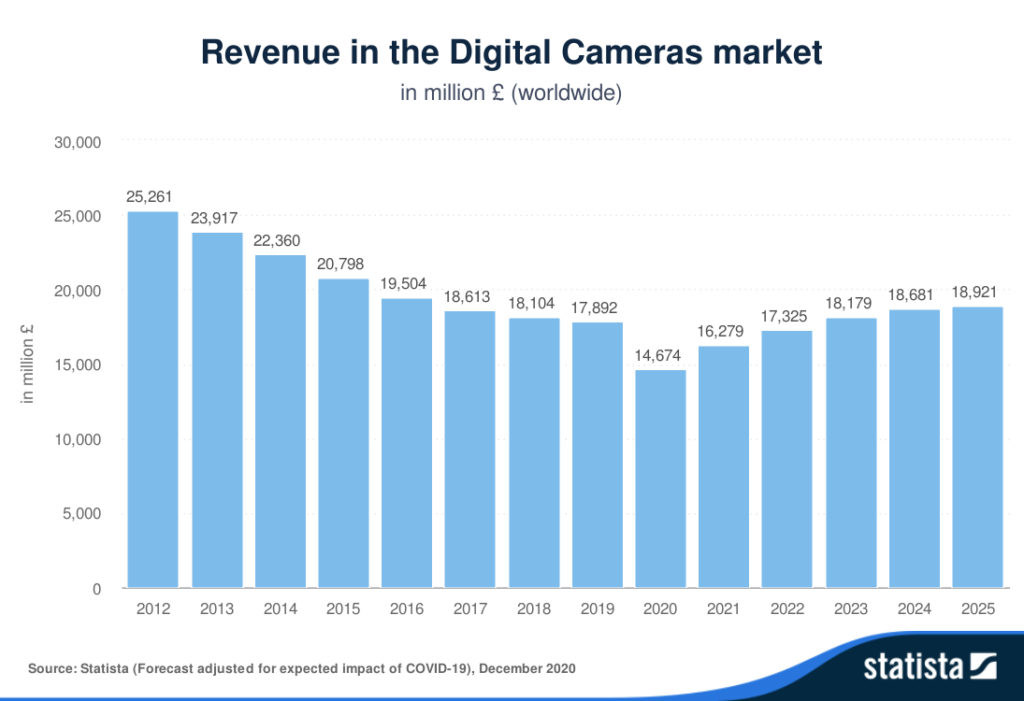In this week’s curiosity box, I have explored topics that covered the following topics
1 – How does our brain prevent us from hallucinating?
2 – Is the love for professional cameras dying?
3 – Why do we cringe when we hear our own voice?
1 – How are we protected against hallucinations?
“We don’t passively perceive the world, but actively generate it…Perception is controlled hallucination … and when we agree about it, we call it a reality”
– Anil Seth.
Take a moment to think about how you perceive the world. How does a violin sound? How does a rose smell? Is there enough salt in your dish?
The sensory organs do one part of the work; after the signals reach the respective regions in our brain, they are processed and only then do we experience the world. Therefore, one can argue that we can experience the world through our brains alone.
Researchers have devised a simple formula for perception: Perception = Senses +Belief.
Belief, or knowledge about something, plays an important part in understanding reality. We all have a common understanding or a belief system on how certain things are. Research has shown that the belief system can become overpowering in some cases, thereby nullifying the need for the sense organs to function when perceiving something. We can get a false sense of perception, viz. hallucination.
All people, to some degree, can hallucinate. Memory can trigger our sensory auditors within our brain to create false perception. For people suffering from psychosis disorders, like Schizophrenia, or people under the influence of drugs like LSD have hyperactive sensory auditors in their brain, thereby making them susceptible to a lot of hallucination.
Hallucinations can make people doubt everything, which is not a pleasant experience. A few like John Nash or Oliver Sacks have got the better of it and have contributed to science and society’s betterment.
2 – Is the love for professional cameras dying?
I first figure out what moment I would like to capture. I then take my DSLR and begin clicking away until I get the right frame and the right balance of the three elements in the exposure triangle: aperture, ISO, and shutter speed. By now, I would have taken at least 30 pictures. Next, I transfer the pictures to my laptop. My favourite picture from the lot goes to the iPad for editing. The edited version of the pictures then comes to the phone. Finally, the picture gets to Instagram.
I am an outlier. You can ask why I don’t use just my phone? Yes, I can cut short the entire process by using my phone directly to take a picture, edit, and upload it to Instagram. The advent of the iPhone and other smartphones with camera disrupted the digital camera market. According to Statista, in 2017, 1 in 10 pictures were taken with a digital camera.

After falling for the last 10 years, the digital cameras’ market is expected to rise in the coming years. DSLRs are adapting to the new age, and the demand for higher-end equipment still exists. Also, the price tag on higher-end smartphones is high, which has now created a scenario where you can get a professional camera that takes better pictures at a cheaper rate. This combined effect has given digital cameras a new life.
But this is definitely an interesting market to keep an eye on. If you were the CEO of a digital camera manufacturer, what would you do?
3 – Why do we cringe when we hear our own voice?
Our voice is more than a mere sound we make. It is our identity. It is part of us. However, it can also make you a question and doubt your identity.
Our voice comes from our vocal cords situated within the larynx. The larynx is a susceptible region and has the highest nerve to muscle fibre ratio. The vocal folds produce sound as they vibrate when air from our lung passes through them. Once the sound is out in the air, it reaches our ears through air conduction. The sound vibrations enter our eardrum and vibrate the three small bones Malleus, Incus, Stapes. After this stage, the hair-like structure called cochlea transfers vibrations to nerve signals for our brain to then convert it in the respective region.
Simultaneously, the vibrations generated in our larynx pass through the skull and reach the eardrum via bone conduction. These vibrations are flattened out and have a lower frequency when it comes to our ears because it travels through our bones.
So when we hear the recorded version of our voices, we miss out the vibrations we would receive through bone conduction. This is when we trike a revelation when we hear our voice recorded. Elements like fear, agony, anger, anxiety, etc., are picked up by us when we hear our voice. Therefore our over critical evaluation of our voice makes us question how we perceive ourselves in society. And therefore, this makes us cringe.